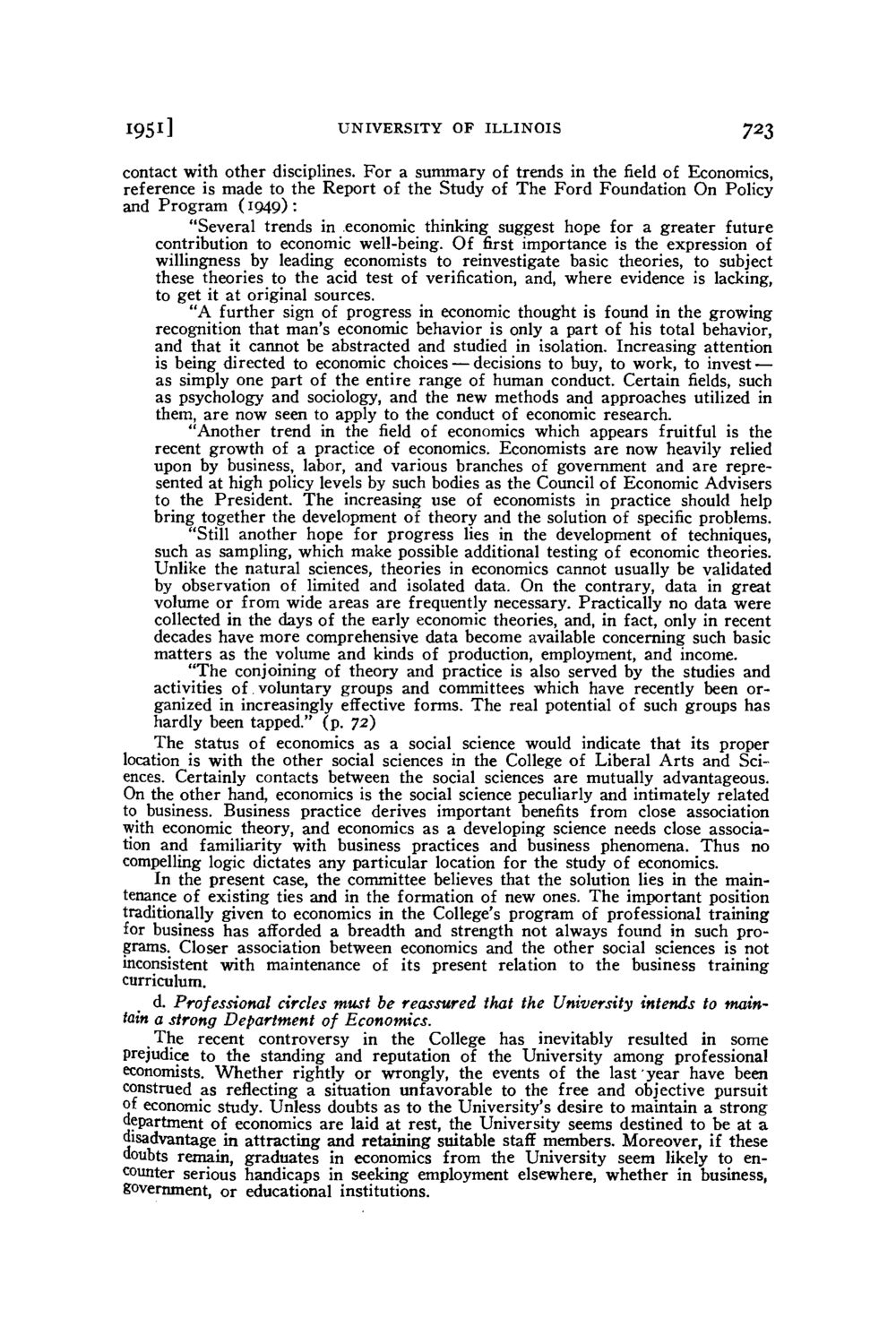| |
| |
Caption: Board of Trustees Minutes - 1952
This is a reduced-resolution page image for fast online browsing.

EXTRACTED TEXT FROM PAGE:
i95i] UNIVERSITY OF ILLINOIS 723 contact with other disciplines. For a summary of trends in the field of Economics, reference is made to the Report of the Study of The Ford Foundation On Policy and Program (1049) : "Several trends in economic thinking suggest hope for a greater future contribution to economic well-being. Of first importance is the expression of willingness by leading economists to reinvestigate basic theories, to subject these theories to the acid test of verification, and, where evidence is lacking, to get it at original sources. "A further sign of progress in economic thought is found in the growing recognition that man's economic behavior is only a part of his total behavior, and that it cannot be abstracted and studied in isolation. Increasing attention is being directed to economic choices — decisions to buy, to work, to invest — as simply one part of the entire range of human conduct. Certain fields, such as psychology and sociology, and the new methods and approaches utilized in them, are now seen to apply to the conduct of economic research. "Another trend in the field of economics which appears fruitful is the recent growth of a practice of economics. Economists are now heavily relied upon by business, labor, and various branches of government and are represented at high policy levels by such bodies as the Council of Economic Advisers to the President. The increasing use of economists in practice should help bring together the development of theory and the solution of specific problems. "Still another hope for progress lies in the development of techniques, such as sampling, which make possible additional testing of economic theories. Unlike the natural sciences, theories in economics cannot usually be validated by observation of limited and isolated data. On the contrary, data in great volume or from wide areas are frequently necessary. Practically no data were collected in the days of the early economic theories, and, in fact, only in recent decades have more comprehensive data become available concerning such basic matters as the volume and kinds of production, employment, and income. "The conjoining of theory and practice is also served by the studies and activities of voluntary groups and committees which have recently been organized in increasingly effective forms. The real potential of such groups has hardly been tapped." (p. 72) The status of economics as a social science would indicate that its proper location is with the other social sciences in the College of Liberal Arts and Sciences. Certainly contacts between the social sciences are mutually advantageous. On the other hand, economics is the social science peculiarly and intimately related to business. Business practice derives important benefits from close association with economic theory, and economics as a developing science needs close association and familiarity with business practices and business phenomena. Thus no compelling logic dictates any particular location for the study of economics. In the present case, the committee believes that the solution lies in the maintenance of existing ties and in the formation of new ones. The important position traditionally given to economics in the College's program of professional training for business has afforded a breadth and strength not always found in such programs. Closer association between economics and the other social sciences is not inconsistent with maintenance of its present relation to the business training curriculum. d. Professional circles must be reassured that the University intends to maintain a strong Department of Economics. The recent controversy in the College has inevitably resulted in some prejudice to the standing and reputation of the University among professional economists. Whether rightly or wrongly, the events of the last year have been construed as reflecting a situation unfavorable to the free and objective pursuit of economic study. Unless doubts as to the University's desire to maintain a strong department of economics are laid at rest, the University seems destined to be at a disadvantage in attracting and retaining suitable staff members. Moreover, if these doubts remain, graduates in economics from the University seem likely to encounter serious handicaps in seeking employment elsewhere, whether in business, government, or educational institutions.
| |